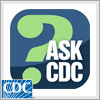
Listen to/view CDC podcasts on your computer or download them for reliable health
and safety information when and where you want it. New to podcasting? See
Podcast Help and RSS Help
National ALS Registry

In this podcast, a listener wants to know about the National ALS Registry. Created: 11/17/2010 by Agency for Toxic Substances and Disease Registry (ATSDR). Date Released: 11/17/2010. Series Name: Ask CDC.
Press Play to listen to this CDC Podcast
Running time = 2:12
To save the Podcast, right click the "Save this file" link below and select the
"Save Target As..." option.
How are we
doing?
Podcasting Resources
Contact Us:
- Centers for Disease Control and Prevention
1600 Clifton Rd
Atlanta, GA 30333 - 800-CDC-INFO
(800-232-4636)
TTY: (888) 232-6348 - Contact CDC–INFO

